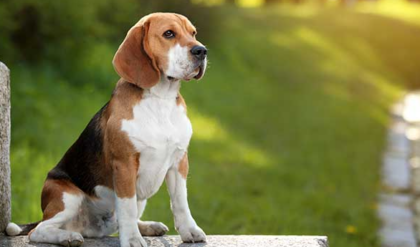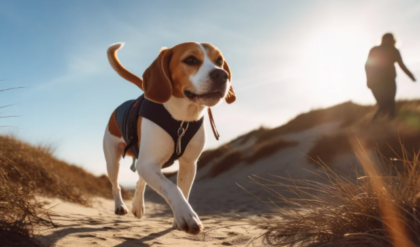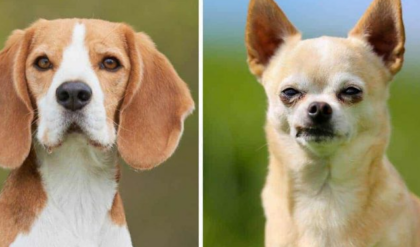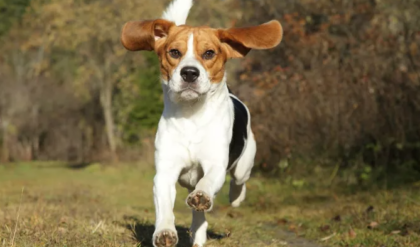Renowned for their adorable floppy ears, endearing personalities, and remarkable scenting abilities, Beagle dogs have secured a special place in the hearts of dog lovers worldwide. This breed’s rich history, unique physical traits, and lovable temperament have contributed to its enduring popularity as a beloved family companion and skilled hunting companion.

Origins & History
The Beagle’s origins can be traced back to ancient Greece, where the term “Beagle” was derived from the French words “bien” and “gueuler,” meaning to “bark well.” However, the modern Beagle breed as we know it today emerged in Great Britain during the 11th century, where it was favored by royalty, including Queen Elizabeth I, for its exceptional hunting abilities.
It wasn’t until the late 19th century that the Beagle gained widespread recognition as a distinct breed. In the 1840s, the breed was introduced to America, where it quickly gained popularity among hunters and dog enthusiasts alike. The American Kennel Club officially recognized the Beagle as a domestic breed in 1885, solidifying its place as a cherished companion and hunting dog.
Early Development
- Bred for hunting hares and small game
- Valued for their keen sense of smell and persistent nature
- Favored by English nobility and commoners alike
Introduction to America
- Brought to America in the 1840s by English immigrants
- Gained popularity among hunters and dog enthusiasts
- Officially recognized by the American Kennel Club in 1885
Breed Standardization
- Breed standards established to ensure consistency
- Focus on physical attributes, temperament, and hunting abilities
- Efforts to maintain the breed’s unique characteristics
Physical Characteristics
Beagles are known for their distinctive and endearing physical traits. These medium-sized dogs have a muscular yet well-proportioned body, with an elongated head and large, drooping ears that give them an irresistible expression.
Body Structure
- Medium-sized breed
- Muscular and well-proportioned body
- Elongated head with a square muzzle
Coat and Color
- Distinctive tri-colored coat (white, brown, and black)
- Short, dense, and weather-resistant fur
- Occasional variations in coat color and patterns
Size and Weight
- Height: 33-42 cm (13-16 inches)
- Weight: 8-16 kg (17-35 lbs)
Temperament & Personality
Beagles are known for their energetic and playful personalities, making them excellent companions for active families. Their strong hunting instinct and independent nature can sometimes lead to stubbornness, but with proper training and socialization, they can become well-mannered and loyal companions.
Energy and Playfulness
- Energetic and active breed
- Enjoy playtime and outdoor activities
- Thrive in environments with ample exercise and mental stimulation
Hunting Instinct
- Bred for hunting and tracking
- Strong sense of smell and excellent scenting abilities
- May exhibit chasing or digging behaviors
Intelligence and Trainability
- Intelligent and quick learners
- Respond well to positive reinforcement training methods
- Require consistent training and socialization from an early age
Sociability
- Generally friendly and affectionate
- Do well in families with older children
- Early socialization is crucial to prevent shyness or aggression
Care & Health
Caring for a Beagle involves understanding their specific grooming needs, exercise requirements, and potential health concerns. With proper care and attention, these loyal companions can thrive and bring joy to their owners for many years.
Grooming and Maintenance
- Low-maintenance, short coat
- Weekly brushing to remove loose hair
- Monthly bath to keep their coat clean and healthy
Exercise and Activity
- Regular exercise and playtime are essential
- Enjoy outdoor activities like hiking, hunting, and fetch
- Mental stimulation through puzzle toys and training
Common Health Issues
- Prone to ear infections (regular cleaning recommended)
- Susceptible to pulmonary stenosis, eye diseases, deafness, hypothyroidism, and epilepsy
- Regular veterinary checkups are essential
Training and Socialization
- Basic obedience training for safety and behavior
- Consistency and positive reinforcement techniques work best
- Early socialization to prevent shyness or aggression
Beagle Dogs in Hunting and Sports
Beagles have a long and storied history as hunting companions, and their natural abilities continue to be celebrated in various hunting and sporting events.
Hunting Abilities
- Excellent scenting abilities for tracking and hunting
- Historically used for hunting hares and small game
- Still employed as hunting dogs in some regions
Field Trials and Hunting Tests
- Organized events to showcase hunting and tracking skills
- Beagles compete in various classes and categories
- Opportunities for owners to demonstrate their dogs’ abilities
Agility and Obedience Competitions
- Beagles excel in agility trials due to their intelligence and athleticism
- Obedience trials highlight their trainability and responsiveness
- Opportunities for bonding and showcasing training efforts
Therapy and Detection Work
- Beagles’ friendly nature and keen sense of smell make them suitable for:
- Therapy dog roles, providing comfort and support
- Detection work for various scents (e.g., bed bugs, explosives)
Living with a Beagle
Owning a Beagle can be a rewarding and enriching experience, but it also comes with its own set of responsibilities and considerations.
Family Life
- Beagles make great family companions, especially for active households
- Early socialization and training are crucial for well-mannered behavior
- Supervision is recommended around small children due to their high energy levels
Apartment Living
- Beagles can adapt to apartment living with proper exercise and mental stimulation
- Their barking tendencies may be a concern for neighbors
- Crate training and noise management techniques are recommended
Separation Anxiety
- Beagles are prone to separation anxiety due to their strong pack mentality
- Gradual desensitization and enrichment activities can help alleviate stress
- Doggie daycare or dog walkers may be necessary for extended periods alone
Feeding and Nutrition
- High-quality, balanced diet tailored to their activity level and life stage
- Portion control to prevent obesity, a common issue in the breed
- Plenty of fresh water available at all times
Conclusion
The beloved Beagle breed has captured the hearts of dog lovers worldwide with its endearing personality, distinctive physical traits, and remarkable hunting abilities. From their origins as skilled hunting companions in Great Britain to their modern-day roles as beloved family pets, Beagles continue to charm and delight their owners.
With proper care, training, and attention to their unique needs, these energetic and affectionate dogs can make wonderful additions to any household. Whether you’re an active family seeking a playful companion, a hunter in search of a skilled tracking partner, or simply someone looking for a loyal and loving furry friend, the Beagle’s versatility and endearing nature make them a breed worth considering.
By understanding their history, temperament, and care requirements, Beagle owners can provide a nurturing environment that allows these delightful dogs to thrive and bring joy to their families for years to come.
Attributes, Temperament, and Hunting Abilities
Beagles are a breed known for their unique attributes, temperament, and exceptional hunting abilities. Understanding these key characteristics is essential for potential Beagle owners to provide the best care and environment for their furry companions.
Physical Attributes
Beagles possess distinct physical attributes that set them apart from other breeds. Their medium-sized, muscular bodies are complemented by an elongated head with a square muzzle. One of the most iconic features of Beagles is their large, drooping ears that add to their charm and contribute to their excellent sense of smell. These physical attributes make Beagles well-suited for their historical role as hunting dogs.
| Physical Attributes | Description |
|---|---|
| Size | Medium-sized |
| Body Structure | Muscular and well-proportioned |
| Head | Elongated with a square muzzle |
| Ears | Large and drooping, contributing to their keen sense of smell |
Temperament
The temperament of Beagles is characterized by their energetic and playful nature. They thrive in environments where they can engage in activities that stimulate both their bodies and minds. While Beagles are generally friendly and affectionate, they also have a strong hunting instinct that may manifest in behaviors like chasing or digging. Proper training and socialization are crucial to channel their energy and prevent any unwanted behaviors.
- Energy and Playfulness: Beagles are known for their high energy levels and love for playtime. Regular exercise and mental stimulation are essential to keep them happy and healthy.
- Hunting Instinct: Bred for hunting and tracking, Beagles have a strong sense of smell and excel in scenting abilities. This instinctual behavior should be managed through training and engaging activities.
- Intelligence and Trainability: Beagles are intelligent dogs that respond well to positive reinforcement training methods. Consistent training from an early age can help harness their intelligence and prevent stubbornness.
- Sociability: While Beagles are generally friendly, early socialization is key to ensuring they interact well with other pets and people. This socialization helps prevent shyness or aggression in different situations.
Hunting Abilities
Beagles have a rich history as hunting dogs, particularly in tracking hares and small game. Their exceptional scenting abilities and keen sense of smell make them valuable assets in hunting scenarios. Even in modern times, Beagles continue to showcase their hunting prowess in various hunting and sporting events, where their skills are put to the test.
- Scenting Abilities: Beagles are renowned for their excellent scenting abilities, which allow them to track and hunt with precision. Their noses are highly sensitive, making them ideal for tasks that require detecting scents over long distances.
- Historical Role: Originally bred for hunting, Beagles have a long-standing tradition as hunting companions. Their agility, stamina, and determination make them well-suited for tracking game in diverse terrains.
- Modern Applications: While the role of Beagles in hunting has evolved over time, they still participate in field trials and hunting tests to demonstrate their skills. These events provide opportunities for Beagle owners to showcase their dogs’ natural hunting instincts.
- Training and Utilization: Training Beagles for hunting requires patience, consistency, and an understanding of their innate abilities. By tapping into their natural hunting instincts through appropriate training, Beagles can excel in various hunting activities.
Efforts to Maintain the Breed’s Unique Characteristics
Preserving the unique attributes, temperament, and hunting abilities of Beagles requires dedicated efforts from breeders, owners, and enthusiasts. Through responsible breeding practices, proper training, and participation in activities that showcase their skills, the essence of the Beagle breed can be upheld for future generations to appreciate.
- Breed Standards: Breed standards outline the physical and behavioral traits that define the Beagle breed. Responsible breeders adhere to these standards to ensure that each Beagle maintains the characteristic features of the breed.
- Health Screening: Regular health screenings help identify and address any genetic predispositions or health issues that may affect Beagles. By prioritizing the health and well-being of the breed, owners can contribute to maintaining its vitality.
- Training Programs: Engaging in training programs that cater to Beagles’ hunting instincts not only enhances their skills but also fosters a deeper bond between dogs and their owners. These programs help Beagles stay true to their hunting heritage.
- Community Engagement: Participating in community events, such as field trials and obedience competitions, allows Beagle owners to connect with like-minded individuals who share a passion for the breed. These interactions promote camaraderie and knowledge sharing.
- Education and Awareness: Educating the public about the unique characteristics of Beagles, including their temperament and hunting abilities, raises awareness about the breed’s special qualities. This knowledge can lead to better care and understanding of Beagles as beloved companions.
In conclusion, Beagles embody a blend of physical attributes, temperament, and hunting abilities that make them truly special dogs. By recognizing and appreciating these qualities, Beagle owners can provide enriching experiences for their furry friends while contributing to the preservation of the breed’s legacy. Through dedication, responsible ownership, and a commitment to upholding the breed’s unique characteristics, Beagles will continue to captivate hearts and inspire admiration for generations to come.






